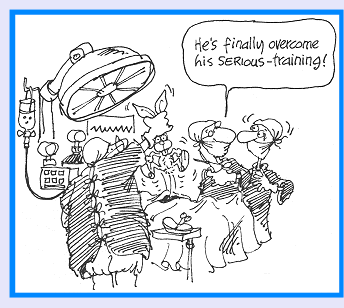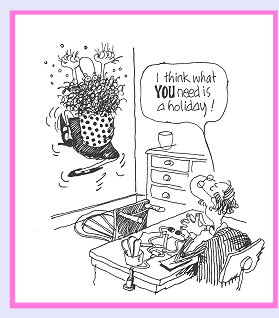«Ideas For Making Most Of The Book»
«Getting Started In Your Hospital»
Finding Your Funny Bone
Incorporating humour into medical practice
By Dr Shayne Yates
(First published in Australian Family Physician, January 2001.)
If you don't think you have the time to read this, then give it to your staff and encourage them to run with the ideas. Once the people around you start boosting their sense of humour and having more fun, you will find it easier to join in and be amused. The flow on to patients will be a natural outcome and they will be encouraged to bring stories, jokes and good humour when they come to see you. The laughter will mean that you and your staff will enjoy your work more, you will be less stressed and patients will heal faster.

People work better when they have fun. Studies suggest that playfulness, laughter, joke telling and fun are essential management tools. David Abramis1 surveyed 589 adults via questionnaire and follow up interview. The results showed several types of play existed at work, and that play had positive effects on the ability to learn, job satisfaction, involvement, and competence. Further studies indicated that joking at work facilitates relationships, reduces tensions and improves group cohesiveness.2,3 Humour has also been advocated as a tool for creating change in organisations.4
Laughter has been demonstrated to lower serum cortisol levels and stimulate the immune system, offsetting the immunosuppressive effects of stress.5,6 In the words of (the real) Dr Patch Adams: 'Seriousness has no healing qualities at all'.
Activating your sense of humour
Everyone has a funny bone or sense of humour. It may help to think of a sense of humour as an appreciation of humour. Just as you can learn to appreciate music, or art or a hobby, so you can learn to better appreciate humour. This is good news because it means that you do not have to be naturally funny, nor do you have to create humour of your own - it is all around you just waiting for you to find it.
Saving lives is very serious business, no one would argue with that, but a sense of humour enables you to separate who you are from that work - so that you take yourself less seriously. Too many people confuse seriousness with professionalism and put a lid on the sense of humour. They are the type of people who go about their work looking miserable to prove how hard they work - which helps no one. What is needed is a little 'fun training' to counter the 'serious training' you've had to become a doctor.
Funny in…funny out
There is really no mystery about being funny, or boosting your sense of humour. If you want 'funny' out of your brain, then you have to put 'funny' in. Instead of leaving humour to chance, you need to build a repertoire of humour in your brain so you can pull something out when you need it - especially those times when you're already running late and you have a waiting room full of sick souls! Here's one for the next patient, and the next and the next…
A woman accompanied her husband when he went for his annual check-up. While the patient was getting dressed, the doctor came out and said to the wife, "I don't like the look of your husband".
"Neither do I" she said "But he's handy around the house."
(Reader's Digest)
Sense of humour training
Here are some easy ways to boost your sense of humour which are inexpensive and fun to do.
Listen to humour on tape and CD in your car
By the time you arrive for work or home, you'll feel more relaxed and walk in with a smile on your face. Our library includes: Yes Minister, Bill Cosby, Billy Connolly, Robin Williams, Steve Wright, Victoria Wood, Ben Elton, Monty Python etc. Remind your family to give you humour gifts for your birthday and Christmas. Here's a sampling:
I think it's wrong that only one company makes the game Monopoly.
(Steve Wright)Women need a reason to have sex. Men just want a place.
(Billy Connolly)Collect stories
You hear stories all day long in your work and they can be very funny in the re-telling. Here are some that have happened to people we know:
I was travelling in the United States and someone asked me what my job was. I replied: "I'm a general surgeon". The other person said, in all seriousness: "Do you only operate on Generals?"
(Doctor, Melbourne)-
Tell jokes and riddles
Everyone can tell a joke, just remember to keep the punchline until the end! Kids, especially love riddles and you can easily buy riddle books:
What do you get if you cross a kangaroo with a sheep?
A woolly jumper.Where do bees go to the toilet?
A BP station.What did the vampire say when he called the blood bank?
Do you deliver? -
Watch funny movies, videos and television shows
One of our favourite ways to start the day is to have breakfast while watching a few minutes of a funny video - it sets our mood for the day. Classics include: A Fish Called Wanda, Fawlty Towers, Vicar of Dibley, Strictly Ballroom, What About Bob, Groundhog Day, Patch Adams, Benny Hill, The Full Monty etc. Why not get your staff to go out a buy a few to get you started, they could even screen them in the patients waiting room.
-
Put up a humour board
The waiting room is perfect for this
 and invite patients and staff to make their contributions - comic strips, ads from old magazines, stories, funny signs, headlines, cartoons.
and invite patients and staff to make their contributions - comic strips, ads from old magazines, stories, funny signs, headlines, cartoons. -
Become a humour consumer
Start collecting cartoons, jokes, greeting cards and funny books - anything strange, old fashioned, forgotten, odd, impossible or brilliant. (Old fashioned medical ideas and cures in books could be copied and circulated just for fun - or used at conferences.) You could use our books "Doctor, I feel funny" and "You Won't Die Laughing!" which are packed with funny stories and humour.
A woman was arrested on drug charges after her 12-year-old daughter took her marijuana to school for 'show and tell', a court in Mackay, Queensland, was told yesterday.
(Odd Spot - The Age)On the back of a shiny red Jeep in a car park at Cronulla was this "For Sale" sign:
First my jet ski, then my CBR 900 bike, then my mates. Now she says that my red toy has to go. Gee I hate growing up.
(Column 8, SMH)According to a new survey, women say they feel more comfortable undressing in front of a man than they do undressing in front of a woman. They say that women are too judgmental, where, of course, men are just grateful.
(Jay Leno) -
Access Internet Humour
You need to be selective, but there are web sites devoted to humour. We have a special humour e-mail list that we use to send regular humour shots that people really appreciate. Typical feedback is "We're all in hysterics" and "Don't you ever sleep?" If you and your team would like to be on our humour e-mail list, just send us an e-mail - it's fun, and free!
The last fight was my fault.
My wife asked, "What's on TV?"
I said, "Dust!"I was in the waiting room of my doctor's office the other day when the doctor started yelling, "Typhoid! Tetanus! Measles!" I went up to the nurse and asked her what the hell was going on. She told me the doctor liked to call the shots.
"A psychologist once said that we know little about the conscience except that is soluble in alcohol."
- Thomas Blackburn -
Props and gimmicks
These are the easiest things in the world to make people laugh. The other thing is that you can't take yourself too seriously when you're wearing a propeller hat, or juggling, or putting plastic ants on the patient's chair, or giving a smiley face sticker, or handing out 'happy lotion' or just wearing one coloured sock. A good source is Bernards Magic Shop in Melbourne - Phone 03 9670 9270.
Finding your funny bone does not have to be difficult. When you go looking for humour, it will find you. As you strengthen your sense of humour, you will find your work gets easier, your relationships will improve and you will be less stressed. When you need to prescribe 'humour' for your patients, just give this article as homework and tell them to bring humour with them next time they visit.
References
- Abramis D J. Play in work: childish hedonism or adult enthusiasm. Am Behav Sci 1990; 33(3):353-373.
- DesCamp K D. Thomas C C. Buffering nursing stress through play at work. West J Nus Res 1993; 15(5):619-627.
- Duncan W J. Feisal J P. No laughing matter. Patterns of humour in the workplace. Organ Dyn 1989; 17(4):19-30.
- Kahn W A. Toward a sense of organisational humour. Implications for organisational diagnosis and change. J Appl Behav Sci 1989;25(1):45-63.
- Berk L. Eustress of mirthful laughter modified natural killer cell activity. Clin Res 1989;37:115.
- Neuroendocrine and stress hormone changes during mirthful laughter. Am J Med Sci 1989; 298:390-396.
«Ideas For Making Most Of The Book»
«Getting Started In Your Hospital»
Dr Shayne Yates
shayne@docfunny.com